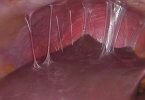What's in this article?
What is Abdominal pain?
A stomach ache is a term often used to refer to cramps or a dull ache in the tummy (abdomen). It’s usually short-lived and is often not serious.
Severe abdominal pain is a greater cause for concern. If it starts suddenly and unexpectedly, it should be regarded as a medical emergency, especially if the pain is concentrated in a particular area.
Call your GP as soon as possible or go to your nearest hospital accident and emergency (A&E) department if this is the case.
If you feel pain in the area around your ribs, read about chest pain for information and advice.
Abdominal pain Facts
- Abdominal pain is pain that is felt in the part of the trunk below the ribs and above the pelvis.
- Abdominal pain comes from organs within the abdomen or organs adjacent to the abdomen.
- Abdominal pain is caused by inflammation, distention of an organ, or by loss of the blood supply to an organ. Abdominal pain in irritable bowel syndrome(IBS) may be caused by contraction of the intestinal muscles or hyper-sensitivity to normal intestinal activities.
- Symptoms associated with abdominal pain may include:
- Bloating
- Gas (flatus, farting)
- Indigestion
- Pain in the upper left or right; middle; or lower left or right abdomen
- Constipation
- GERD (gastro-esophageal reflux disease)
- Heartburn
- Chest pain
- The cause of abdominal pain is diagnosed on the basis of the characteristics of the pain, physical examination, and testing. Occasionally, surgery is necessary for diagnosis.
- The diagnosis of the cause of abdominal pain is challenging because the characteristics of the pain may be atypical, tests are not always abnormal, diseases causing pain may mimic each other, and the characteristics of the pain may change over time.
Causes of Abdominal Pain
Whether it’s a mild stomach ache, sharp pain, or stomach cramps, abdominal pain can have numerous causes. Some of the more common causes include:
- Indigestion
- Constipation
- Stomach virus
- Menstrual cramps
- Irritable bowel syndrome (IBS)
- Food poisoning
- Food allergies
- Gas
- Lactose intolerance
- Ulcers
- Pelvic inflammatory disease
- Hernia
- Gallstones
- Kidney stones
- Endometriosis
- Crohn’s disease
- Urinary tract infection
- Gastroesophageal reflux disease (GERD)
- Appendicitis
Symptoms of Abdominal Pain
If your abdominal pain is severe or recurrent or if it is accompanied by any of the following symptoms, contact your health care provider as soon as possible:
- Fever
- Inability to keep food down for more than 2 days
- Any signs of dehydration
- Inability to pass stool, especially if you are also vomiting
- Painful or unusually frequent urination
- The abdomen is tender to the touch
- The pain is the result of an injury to the abdomen
- The pain lasts for more than a few hours
These symptoms can be an indication of an internal problem that requires treatment as soon as possible.
Seek immediate medical care for abdominal pain if you:
- Vomit blood
- Have bloody or black tarry stools
- Have difficulty breathing
- Have pain occurring during pregnancy
Home Care Treatment for Abdominal pain
You can try the following home care steps to ease mild abdominal pain:
- Sip water or other clear fluids. You may have sports drinks in small amounts. (People with diabetes must check their blood sugar often and adjust their medicines as needed).
- Avoid solid food for the first few hours.
- If you have been vomiting, wait 6 hours, and then eat small amounts of mild foods such as rice, applesauce, or crackers. Avoid dairy products.
- If the pain is high up in your abdomen and occurs after meals, antacids may help, especially if you feel heartburn or indigestion. Avoid citrus, high-fat foods, fried or greasy foods, tomato products, caffeine, alcohol, and carbonated beverages.
- Avoid aspirin, ibuprofen or other anti-inflammatory medications, and narcotic pain pills unless your health care provider prescribes them. If you know that your pain is not related to your liver, you can try acetaminophen (Tylenol).
These additional steps may help prevent some types of abdominal pain:
- Drink plenty of water each day.
- Eat small meals more frequently.
- Exercise regularly.
- Limit foods that produce gas.
- Make sure that your meals are well-balanced and high in fiber. Eat plenty of fruits and vegetables.
Sudden severe abdominal pain
If you have sudden agonising pain in a particular area of your tummy, call your GP immediately or go to your nearest A&E department. It may be a sign of a serious problem that could rapidly get worse without treatment.
Serious causes of sudden severe abdominal pain include:
- appendicitis – the swelling of the appendix (a finger-like pouch connected to the large intestine), which causes agonising pain in the lower right-hand side of your abdomen, and means your appendix will need to be removed
- a bleeding or perforated stomach ulcer – a bleeding, open sore in the lining of your stomach or duodenum (the first part of the small intestine)
- acute cholecystitis – inflammation of the gallbladder, which is often caused by gallstones; in many cases, your gallbladder will need to be removed
- kidney stones – small stones may be passed out in your urine, but larger stones may block the kidney tubes, and you’ll need to go to hospital to have them broken up
- diverticulitis – inflammation of the small pouches in the bowel that sometimes requires treatment with antibiotics in hospital
If your GP suspects you have one of these conditions, they may refer you to hospital immediately.
Sudden and severe pain in your abdomen can also sometimes be caused by an infection of the stomach and bowel (gastroenteritis). It may also be caused by a pulled muscle in your abdomen or by an injury.





